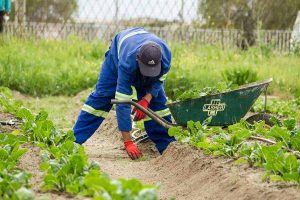In this generation, it is always quite a challenge to building a viable business via farming. Those who have some level of experience and results in this regard often have an insight into what it takes to operate a profitable farming venture. Time and experience have taught them that a profitable farm is beyond preparing the land, harvesting and taking the harvest to the market. Experienced people often operate their farms as a full-scale business. This means they only make decisions based on the profit potentials.
Is farming profitable?
Farming is a profitable venture depending on the approach adopted. At the close of each farming season, each farmer ought to know how productive and profitable his farming year has been. This is considering the numerous factors that militate against optimizing profits. Some of the factors that may have adverse effects on the profitability of farming include the cost of agriculture, land availability, weather, and absence of new technology and lack of access to the market.
The productivity of a farm is very vital because it means better competitiveness in the market and an increase in income. It also implies higher labor output and overall wellbeing.
How Can You Make Your Farm More Profitable?
The profitability of your farming venture is subject to several factors and decisions. here are a few things you need to put in place for profitability purposes.
1. Market Research
One of the major mistakes farmers make is that they tend to go into farming without first carrying out thorough market research. Most of them simply believe that there will always be an available market for what they have to sell. The challenge with this is that it creates a situation where the market becomes saturated with a particular commodity. This situation thus forces the farmers to lower the prices of their commodity in a bid to compete. Therefore, if you desire to run a profitable farming venture, it becomes quite imperative to research on the product you can easily sell profitably.
It is also advisable that you build strong relationships with your customers before you plant your crops. You should also keep a solid record of what level of profitability each crop holds. These are critical to running a profitable farming venture.
2. Have a business plan
You must have a well thought out business plan. This is because a business plan is critical to the viability of any enterprise. Farmers are not exempted in this regard. Business planning assists an entrepreneur to have a better grasp of who he is, what they intend to do and how to get to where they want to go. If success is what you desire in the venture, you need a good business plan!
Also, business plans are important for people who seek to get some measure of financing for their enterprise. This funding is always useful for funding farm infrastructure, farmland, and the costs of machinery. Moneylenders will always ask to see a business plan before they can consider a loan request.
3. Going for the right crop
 When choosing a cropping plan for your venture, there are several factors you have to consider. These factors can be ecological, or biological. Some of the factors have to do with the equipment and knowledge available. Most small scale farms begin with quick-growing annual plants and soon delve into the perennial ones with time. Knowing that your soil and climate favor your desired crop is very important. And this can may require a lot of trial and error. In addition to the aforementioned, your marketing strategy also plays a vital role in the entire set-up.
When choosing a cropping plan for your venture, there are several factors you have to consider. These factors can be ecological, or biological. Some of the factors have to do with the equipment and knowledge available. Most small scale farms begin with quick-growing annual plants and soon delve into the perennial ones with time. Knowing that your soil and climate favor your desired crop is very important. And this can may require a lot of trial and error. In addition to the aforementioned, your marketing strategy also plays a vital role in the entire set-up.
4. Diversification
The same way smart people diversify their stock portfolio is the same way farmers should diversify their crop collection. The main reason for the need to diversify your crops is to mitigate the effect of a possible crop failure. By planting different crops, you are simply signing yourself up for a form of the insurance policy. This plan is to serve as a form of hedge against all possible catastrophes. It is also a strategy that should help you know which of the crops favor you more. It also helps you to know which of the crops more market is friendly.
5. Think big but start small
If you are thinking of kick-starting your farm with all the required machinery and expertise in place, you may never start. But, no matter the scale you want to begin from, there are usually loan facilities which you can leverage upon. It is therefore advisable that you consult your financial advisor before making any decision in this regard. When going for a loan, bear it in mind that you don’t need debts you can’t manage. This is why experts often advise that you start small and scale up with time.
6. Build capacity
For you to build a viable farming enterprise, you must have a curious mind. You need to have a strong desire to learn also implementing whatever you learn. This means that you have to subscribe to newsletters, attend conferences, and buy books and magazines. You must keep building your knowledge base per time. This should keep you in the loop as regards the latest innovations and developments in the agricultural sector.
Also, you may want to explore building strong relationships and networks with other farmers. You also need to learn from the success of others in the venture. This is one sure strategy that should save you from making unnecessary mistakes.
7. Keep records
Proper record-keeping is essential for understanding what is working in your business and what is not working. It also helps you to make the needed changes in your operations every other year. Keeping proper records also means that you will be less susceptible to making the same mistakes over and over again. Farming is quite stressful and requires a lot of inputs. This is why you do not need to assume anything.
How Can I Improve My Crop Yield?

The yield of crops forms a core aspect of the life of a farmer. It usually has a telling effect on the overall profitability of the farm. It is thus essential to understand how to improve the crop yield. With new technologies and innovations out there, it has become increasingly easier for farmers to meet and exceed certain targets. Here are a few tips that should help you boost the overall profitability of your farm:
Early planting
By taking a holistic look at previous seasons and the crop growth pattern, you ought to be able to chart a course for the new season. Looking back at previous seasons will help you understand the failures and successes recorded. This would help you get a better perspective on things. You must conduct a soil test before anything. The reason for this is that your soil will most probably have a telling effect on the output. The moment you have fully analyzed everything, you will be able to begin planting.
Understand the seed potential
During planning the planting strategy, you do not plant with the hope of the best coming out of it. This is why you need to devout some time to understand the soil and seed potential. This will save you time and money. Ensure that the seeds you intend using are of premium quality. With this kind of consideration, you can easily foretell the outcome of your planting season with some measure of accuracy.
Soil rotation isn’t such a bad idea!
Different crops often require different conditions. This is why soil rotation is often advised for each year. Planting the same crop on the same soil every year has a way of limiting its potentials. Also, by planting different crops on the same soil, you will be making the demands on the soil healthier.
Proper water drainage
Water management is one of the most important aspects of a successful farming campaign. Climatic conditions can vary sometimes, but you may come up with an effective irrigation system that can give your crops the right quantity of water per time. You also need an effective drainage system that should help you properly drain excess water. You must ensure that your irrigation system does not expose your crops to too much water. This could by extension lead to water clogging and Stalinization.
Ensure you scout the land
Even with the availability of technology, you must take out time to scout your land on foot. This is one reliable way for you to know your soil while also monitoring any possible weed conditions that may harm your yield. People who do not use this strategy often miss out on possible red flags.
Fertilizers are important
Your soil needs certain nutrients if it must experience optimum performance. Nutrients such as phosphorus, potassium, and calcium are needed for increasing the growth of your crop. You, therefore, need the right fertilizer and fertilizer spreader to get the job done.
Conclusion
Running a profitable farming enterprise is predicated largely upon having the right set of information at your disposal. The profitability of any farming venture is subject to several factors and conditions. Having a solid grasp of them should certainly set you on the path to riches.
You May Like This Article As Well:
Is Investing In Stocks Worth It?











![Fan Expo Chicago [Convention], Donald E. Stephens Convention Center, 16 Aug What You Need to Know](https://www.thefreemanonline.org/wp-content/uploads/2024/09/Fan-Expo-Chicago-Convention-Donald-E.-Stephens-Convention-Center-16-Aug-What-You-Need-to-Know-300x200.jpg)










Add Comment